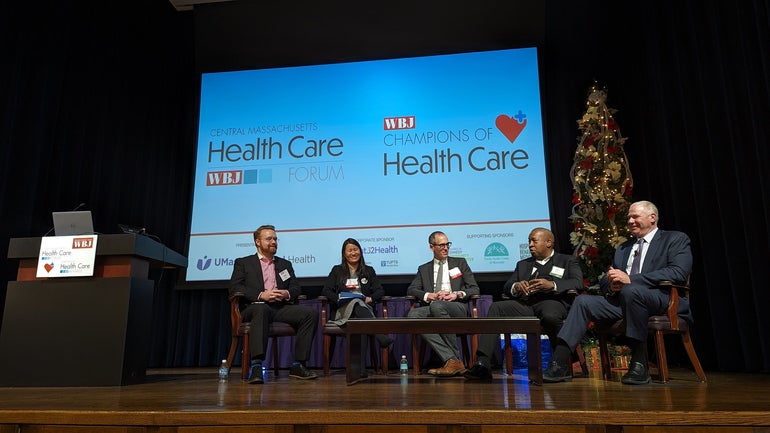Panel: Healthcare system is broken, and collaboration is essential for recovery
 Photo | Tammy Woodard
(From left) WBJ Editor Brad Kane, and Health Care Forum panelists Amie Shei, Dr. Robbie Goldstein, Lou Brady, and Dr. Eric Dickson
Photo | Tammy Woodard
(From left) WBJ Editor Brad Kane, and Health Care Forum panelists Amie Shei, Dr. Robbie Goldstein, Lou Brady, and Dr. Eric Dickson
Health care in Massachusetts is facing multipronged challenges, with no silver bullet solution. To make it through, healthcare providers, legislators, and advocates need to be collaborative in addressing workforce concerns, the opioid crisis, and the payor system.
“This is not a time for us to be competing,” said Dr. Eric Dickson, president and CEO of UMass Memorial Health in Worcester.
Dickson’s comments were part of a larger message delivered by four panelists at the WBJ Champions of Health Care Champions Awards & Forum, held on Wednesday at The College of the Holy Cross in Worcester.
Workforce challenges are the root of myriad difficulties in the current healthcare model, said Dickson. Inadequate numbers of providers at skilled nursing facilities means patients are staying in the hospital longer, straining inpatient care.
“We are struggling with capacity across the board,” said panelist Lou Brady, president and CEO of Family Health Center of Worcester, a federally qualified health center providing care for individuals regardless of ability to pay.
“The business model at its core is broken,” said Brady of the healthcare payment system.
How payments are made and how care is prioritized is a health equity issue, said Dickson.
The Family Health Center is struggling to take on more primary care patients, Brady said, based on capacity. The issue was already moving in a concerning direction prior to the pandemic, and it continues to worsen.
“We can’t recruit our way out of this,” he said.
The problems exist on a macro level, not just at individual hospitals and health centers. At a public health level, access to care is a concern, said panelist Dr. Robbie Goldstein, commissioner of the Massachusetts Department of Public Health.
A lack of access has endless downstream complications, Goldstein said, highlighting individuals with opioid addictions.
Coupled with access is the issue of affordability, said panelist Amie Shei, president and CEO of The Health Foundation of Central Massachusetts.
“Healthcare costs are growing at a higher rate than wages,” Shei said.
With the COVID-19 pandemic mostly in the rearview, it is not the time to become lax on emergency preparedness.
“It is our responsibility to always be prepared,” said Goldstein.
The public health and emergency medical workforce must always be actively trained and ready to respond, he said. Collaborating across systems is essential, and needs to be ongoing.
“When we’re not working together, people are dying,” said Goldstein.
Health care at home programs are showing promise, said Dickson, in alleviating the in-hospital burdens and in delivering better patient outcomes. Developing pathways for the immigrant workforce is a priority too, both to increase the talent pool and to deliver better, more culturally appropriate care.
Different populations have seen the ramifications of the workforce challenges play out differently, said Shei. Marginalized groups are disproportionately impacted by limits on care, she said.
The Wednesday event also included an awards program for WBJ’s inaugural Champions of Health Care, which recognized individuals who have made a significant positive impact on the Central Massachusetts healthcare landscape.













0 Comments